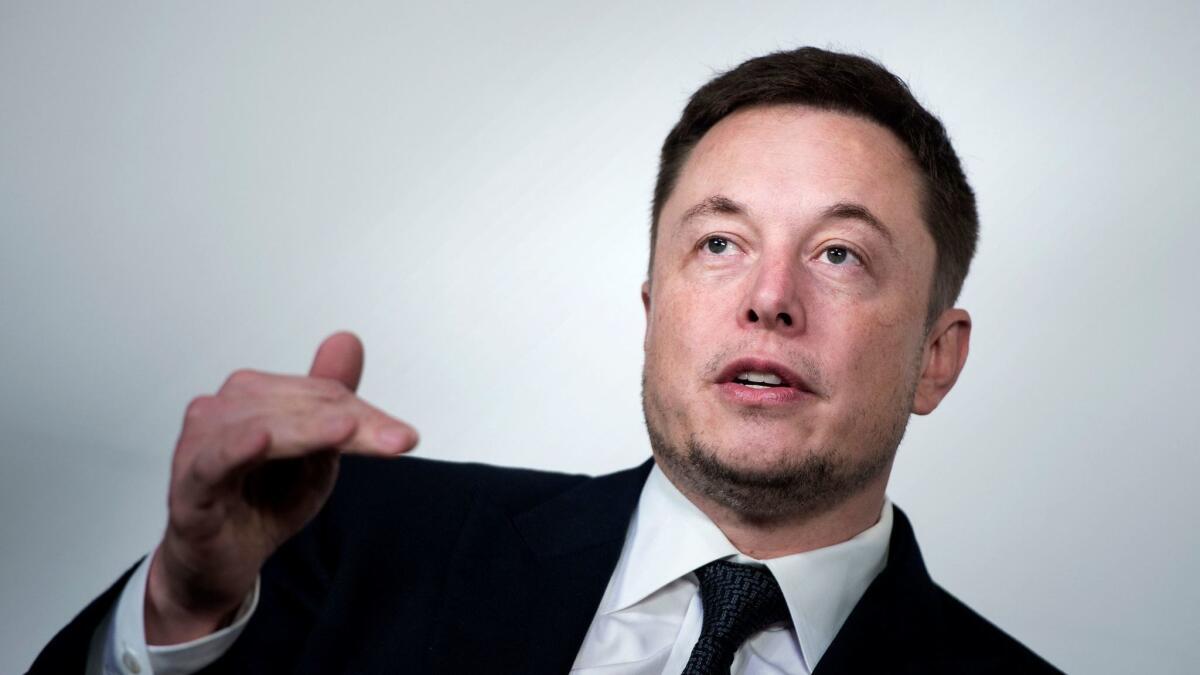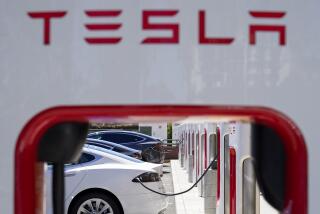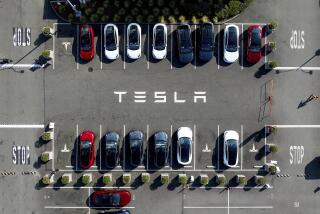Short sellers so far are losing their bets against Elon Musk and Tesla

Mark Spiegel begins some mornings contemplating Tesla’s fate from the bathroom of his high-rise apartment, where two computer screens are perched near the bathtub for instant updates on his Twitter feed and stock prices.
The hedge fund manager spends much of his day at his dining room table, where he fires off tweets explaining his high-stakes bet that Tesla, a darling of Silicon Valley, a $60-billion (market value) behemoth, will eventually fail, sending its stock price tumbling.
So far, the bet has been mostly a loser. Tesla’s stock price has gyrated wildly but is up 9% for the year and 30% over the past month. Spiegel, however, isn’t ready to relent. “I just don’t want it to kill me in the short term,” he says as his eyes toggle between computer screens and a Pomeranian pleading for attention around his ankles.
Spiegel’s small hedge fund, Stanphyl Capital, is part of one of Wall Street’s most aggressive bets against a single company in history. The $10-billion wager has set up a marathon battle between one of Silicon Valley’s most outspoken leaders, Tesla Chief Executive Elon Musk, and some of Wall Street’s most notorious doomsayers.
It comes at a time when many short sellers are struggling. The number of hedge funds focused on betting against companies has fallen by more than half as U.S. markets started a record upswing nearly a decade ago. Since 2013, short-seller campaigns against a company’s stock have lost an average of about 0.5%, according to Activist Insight Shorts, a data provider.
For those betting against Tesla, the fight has been particularly tough. Musk wields his 23 million Twitter followers against his critics with rapid-fire tweets, and he commands a loyal group of believers who can frustrate his critics.
“These people are much more concerned about profits than what’s best for our children,” Ross Gerber, a Los Angeles investor who backs Tesla, said of short sellers. “Morally speaking, you can short Snapchat all you want. Go short Facebook. Tesla’s whole purpose is to create an electric infrastructure so we can address the issue of climate change.”
The fight has already claimed one casualty. Infamous short seller Andrew Left, who has been a vocal critic of Musk and Tesla for years, relented last month and switched from attacking the company to praising it. “It’s not worth the brain damage. Nobody can change the narrative on this thing,” he said in an interview before announcing his decision.
But Spiegel, 57, and many others are still not ready to back down. “I am very patient,” he said.
Short sellers operate by borrowing shares in a company then selling them in hopes of buying the same number of shares later at a lower price. If the stock’s price falls, they make money by pocketing the difference; if it rises, they lose.
This wager on gloom has unnerved CEOs who view their stock price as a daily report card and are fearful that short sellers are manipulating the market for profit. The growing use of computer algorithms that scan Twitter and other social media sites to make trading decisions is exacerbating the problem, some critics say. If short sellers spread false or negative information about them online, they say, it can unfairly shift the momentum of their stock.
To even the playing field, Nasdaq has called for new rules requiring short sellers to disclose more information about the positions they hold against companies.
Short sellers worry they are being unfairly hammered and that efforts to push new regulations could hand an unfair advantage to the companies they target. Their critics are ignoring the good they do, they say, including identifying potentially fraudulent companies such as Enron, which helps mom-and-pop investors.
Fahmi Quadir, founder and chief investment officer at Safkhet Capital, has been heralded as one of the first short sellers to target Valeant Pharmaceuticals. After reaching more than $250 a share, the company’s stock price tumbled amid accusations of a massive fraud.
“In a sense, it’s much harder now,” said Quadir. “Investors care less about the overall fundamentals, even if these companies are engaged in potentially fraudulent activities.”
Musk has not always hated the shorts. In a January 2012 tweet, the billionaire said that while “they cause me grief, I would defend the rights of shorts to exist.”
But his grudging support has since turned to apparent disdain. “The last several years have taught me that they [short sellers] are reasonably maligned,” he said in an October tweet. “What they do should be illegal.” Musk’s office did not return calls asking for an explanation of his change of heart.
Musk has attracted some formidable opponents, including Jim Chanos, who bet against energy giant Enron before its collapse, and Steve Eisman, who made millions betting against the housing market before the global financial crisis. Both have said they are shorting Tesla’s stock.
Their arguments against Tesla range from competitive — that it will eventually be eclipsed by more-experienced carmakers — to allegations that the company is exaggerating its production figures. Some are skeptical that the company will be able to pay off or refinance more than $1 billion in bond payments coming due over the next year.
Hedge fund manager David Einhorn recently compared Tesla to Lehman Brothers, which his firm, Greenlight Capital, bet against before its 2008 collapse. “Like Lehman, we think the deception is about to catch up to TSLA,” Greenlight said in a quarterly investor letter. “Elon Musk’s erratic behavior suggests that he sees it the same way.”
The battle reached a peak in August when Musk tweeted that he had funding “secured” to take Tesla private, sending the company’s stock price soaring. Two weeks later, Musk backed away from the plan, and in October reached a $20-million settlement with the Securities and Exchange Commission, which said he had lied to investors about the probability of such a deal. (A week later, Musk taunted the agency as the “Shortseller Enrichment Commission.”)
Spiegel, meanwhile, is still convinced that Tesla will eventually run out of steam. His $8-million, 7-year-old hedge fund is down about 15% so far this year, mostly due to the bet against Tesla. The fund has other investments that have worked out better, including positive bets on a telecommunications company and in the agriculture sector. A wager that U.S. stocks will drop overall has also recently been profitable.
“We’re actually making really good money today because the market is tanking and we’re in that short,” he said in October, on a day when the Standard & Poor’s 500 fell nearly 2%.
But whenever Tesla’s stock price moves too high, as it did after Musk’s tweet about taking the company private, Spiegel must adjust. “You wind up essentially getting whipsawed many times,” he said. “We have realized a lot of losses there.”






